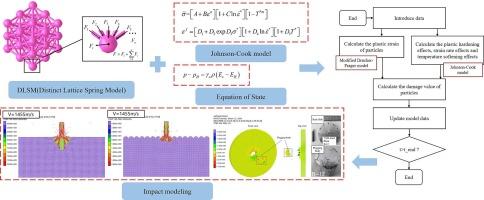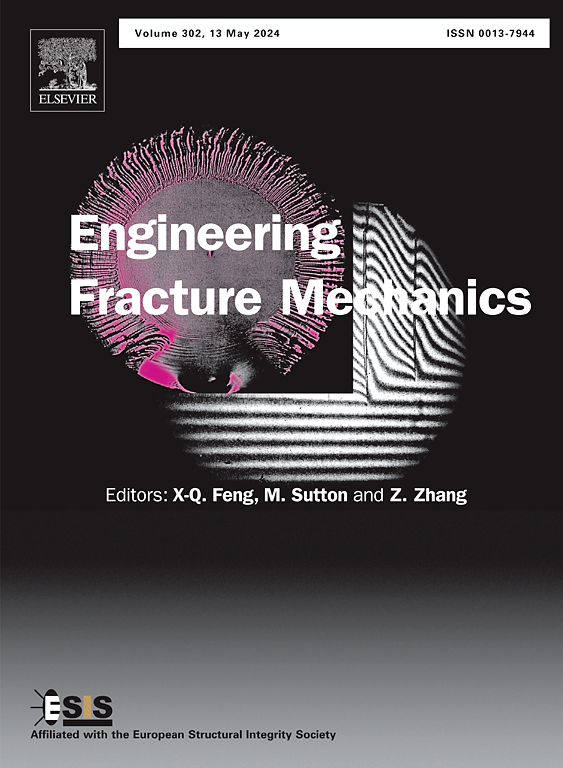约翰逊-库克-分格弹簧模型的开发及其在射弹穿透金属目标中的应用
IF 4.7
2区 工程技术
Q1 MECHANICS
引用次数: 0
摘要
射弹穿透金属目标在现代防护结构工程、恐怖袭击中的损伤评估、汽车碰撞事故分析等方面发挥着重要作用。金属目标的穿透过程具有大变形、高温、高压和动态损伤的特点,可归类为一个连续-非连续的动力学过程。为了捕捉金属材料在高速穿透过程中的动态响应,Johnson-Cook 模型被应用到连续-离散模型中,即分格弹簧模型(DLSM)。这是通过重新定义 DLSM 中的构成模型来实现的,其中考虑了塑性硬化(塑性应变效应)、应变速率、温度、损伤演变、状态方程等因素,从而建立了一个名为 JC-DLSM 模型的新数值模型。通过研究泰勒杆高速冲击实验、薄金属板穿透实验和钛合金靶弹丸冲击实验,对该模型进行了验证。在所考虑的所有情况下,数值建模与实验数据之间都取得了良好的一致性,从而证明了 JC-DLSM 能够再现高速冲击/穿透下金属的损伤特征和弹道极限。然后,研究了弹丸形状、金属靶表面构造对穿透损伤模式特征的影响。这有助于更好地理解金属目标在穿透或撞击时的损伤机制,为分析和优化防护工程结构的抗穿透性提供了计算手段。本文章由计算机程序翻译,如有差异,请以英文原文为准。

Development of Johnson-Cook-Distinct Lattice Spring Model and its application in projectile penetration into metal targets
Projectile penetration into metal targets plays an important role in modern protective structure engineering, damage assessmentin terrorist attacks, and car clash accident analysis, etc. The penetration process of metal target has been characterized by large deformation, high temperature, high pressure, and dynamic damage, which can be classified as a continuous-discontinuous dynamical process. To capture the dynamic responses of metal materials subjected to high-speed penetration, Johnson-Cook model has been implemented in a continuum-discrete model, namely, Distinct Lattice Spring Model (DLSM). This is achieved by redefining the constitutive model in DLSM, with plasticity hardening (plastic strain effects), strain rate, temperature, damage evolution, equation of state, etc., being taken into account, thus developing a new numerical model called JC-DLSM model. This model is validated through studying Taylor rod high-speed impact experiments, thin metal plate penetration experiments, and projectile impact experiments on titanium alloy targets. Good agreement between numerical modelling and experimental data has been achieved for all cases considered, thereby demonstrating the capability of JC-DLSM to reproduce the damage characteristics and ballistic limits of metals under high-speed impact/penetration. Then, the impacts of projectile shape, metal target surface configuration on the characteristics of penetration damage patterns have been investigated. This contributes to a better understanding of the damage mechanisms of metal targets upon penetration or impact, facilitating the computational means for analysing and optimizing the penetration resistance of protective engineering structures.
求助全文
通过发布文献求助,成功后即可免费获取论文全文。
去求助
来源期刊
CiteScore
8.70
自引率
13.00%
发文量
606
审稿时长
74 days
期刊介绍:
EFM covers a broad range of topics in fracture mechanics to be of interest and use to both researchers and practitioners. Contributions are welcome which address the fracture behavior of conventional engineering material systems as well as newly emerging material systems. Contributions on developments in the areas of mechanics and materials science strongly related to fracture mechanics are also welcome. Papers on fatigue are welcome if they treat the fatigue process using the methods of fracture mechanics.

 求助内容:
求助内容: 应助结果提醒方式:
应助结果提醒方式:


